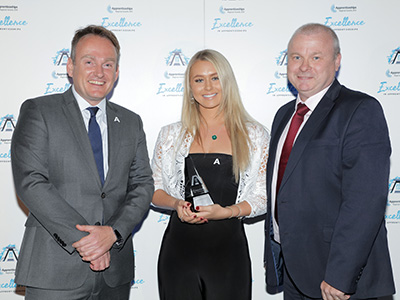Course overview
South Tees Hospitals NHS Foundation Trust: Chartered Manager Degree Apprenticeship
Hear from Caroline who has experienced the benefits of apprenticeships from both sides – as an apprentice herself, and as manager of apprenticeship training at South Tees.
The CMDA is a comprehensive programme that equips apprentices with the essential skills and knowledge needed to excel in management roles. By studying for a BA (Hons) Management Practice degree from Teesside University International Business School whilst working in a relevant role, apprentices gain a unique blend of theoretical insight and hands-on experience. Upon successful completion, apprentices earn an honours degree and full Chartered Manager status from the Chartered Management Institute (CMI), the highest recognition in the management profession, valued across all sectors.
Who is this apprenticeship for?
This apprenticeship is ideal for businesses aiming to develop their future leaders. Whether your apprentice is at the start of their leadership journey or an existing manager seeking structured development, the CMDA is designed to support individuals from any sector who are ready to take on greater responsibilities in managing projects, people, operations, and services to ensure long-term organisational success.
Five reasons your business needs a Chartered Manager Degree Apprentice:
- 1. Immediate contribution: your apprentice applies cutting-edge knowledge directly to your business, delivering tangible results from day one.
- 2. Strategic leadership: develop leaders who are equipped with the skills and insight needed to navigate today’s challenges and tomorrow’s opportunities.
- 3. Dual accreditation: alongside a degree, your apprentice earns a Level 5 Diploma in Management and Leadership from the CMI, enhancing their professional qualifications.
- 4. Professional development: your apprentice gains access to exclusive CMI networking events, lectures from industry experts, and membership benefits that support their ongoing growth.
- 5. Long-term impact: by investing in your team’s development, you enhance retention and ensure your business is equipped to achieve sustainable success.
This course is for apprentices who want to become professional managers – taking responsibility for projects, people, operations and/or services to deliver long-term organisational success. Apprentices could be at the start of their leadership career, from any sector, in any size organisation, aspiring to become a professional manager, or an existing manager with practical experience, but wanting a more structured learning approach and further development.
Please note, we can only respond to enquiries from employers, or individuals with agreement from their employer to undertake an apprenticeship.
Course details
Course structure
Year 1 core modules
Business Operations and Planning
You are introduced to business process planning, operations, resourcing, and quality planning and implementation. Learn several key strategies, concepts and models that help you develop knowledge of appropriate management tools to stimulate resource planning and business process improvement. You pay particular attention to identifying key concepts and relationships within sustainable operations and supply chains.
You gain an overview of transformational technologies and examine how they have impacted business through relevant emerging technologies, such as AI, blockchain, augmented reality and virtual reality. Identify how these converging technologies transform business and which human skills are required to adopt them.
Fundamentals of Human Resource Management
You gain a core understanding of strategic human resource management. Focus on your organisation's human resource elements and reflect upon other organisations and case studies.
Strategies for Work-Based Learning and Resilience
You effectively understand academic skills, work-based learning and strategies to develop personal resilience in the workplace. Study to become an effective work-based learner, developing a personal perspective on your own learning and development. Learn how to critically reflect to improve your professional practice.
Year 2 core modules
You gain an understanding of the way in which accounting is used in the external evaluation of organisations and develops the ability to use accounting and finance techniques in decision making, control, management and adding value to performance.
Evidence-Based Decision Making
You gain practical skills and theoretical knowledge to design and conduct impactful, ethical, feasible and credible research projects. Develop a research proposal demonstrating your ability to devise and plan out projects.
Planning and Management of Projects
Learn the fundamental concepts of project planning and management, focusing on feasibility to post implementation, including risk and contingency management. This module prepares you for your final-year professional project.
Marketing plays a significant role in any industry, but particularly in the service sector. Organisations cannot operate without promotion or market research for communicating with a range of customers. Examine factors that influence the marketing of products and services and analyse the effectiveness of promotional campaigns for organisations to achieve their marketing objectives.
Year 3 core modules
Dynamics of Organisational Change
You learn knowledge and skills in planning, managing and reflecting on organisational change. It is suitable for aspiring leaders in a range of professional contexts, involving consideration of change processes and impacts at a variety of scales. You develop understanding of the complexities and challenges in organisational change including organisational culture and resistance, as well as being creative and innovative in application of theory to propose solutions and overcome barriers in changing organisations.
Leading and Managing Others in the Workplace
Understand the concept of leadership and management, developing the skills you need to work collaboratively with others to improve performance across a variety of situations and settings. Explore your own leadership style and assess how this can be adapted within different contexts and teams.
Through negotiation between the University, workplace and learner, you design and carry out an inquiry-led activity (project) demonstrating research and development approaches to your own professional development and the development of your organisation. You manage a work-based project to initiate and lead change. The content and context of your project is unique to you or your group.
This is a 30-credit module.
Modules offered may vary.
How you learn
The course is a degree apprenticeship and the learner must be in relevant full-time paid employment throughout the duration of their studies.
The CMDA has been developed to recognise the workplace as a centre of knowledge building, and the tutors support the apprentice by combining learning opportunities within the workplace and the learning environment of the University. This approach enables the apprentice to meet the higher learning and skills required for their success and yours, as an employer, now and in the future.
A workshop style is adopted that enables sharing and creation of knowledge and engaging with others to identify solutions to organisational problems. The assessments provide the opportunity to apply this knowledge and learning directly to the workplace setting.
The CMDA utilises a blended learning experience which requires apprentices to be on campus an average of 14 days per academic year with supporting remote sessions, whilst applying what they have learned within their roles.
How you are assessed
The apprentice is assessed as part of the BA (Hons) Management Practice degree and each of these assessments forms the basis of a portfolio which evidences the achievement of the CMDA. They have regular reviews with you as the employer and the University to track their progress.
Apprentices develop a separate portfolio of evidence consisting of knowledge gained in the classroom and practical activities conducted in the workplace. This forms an end-point assessment (EPA) which is presented to the Chartered Management Institute (CMI) at the end of the course to apply for Chartered Manager Status.
The assessments are designed to test the apprentice's knowledge, understanding and skills and include:
- A portfolio containing work that covers the whole of the Chartered Manager Standard they need to meet.
- In their final year, a 360 degree feedback on their performance from managers and peers.
- A work based professional project - a substantial piece of work undertaken in the final year. You as the employer and the University work with the apprentice to agree the project, and they are supervised and supported by the University and you as the employer.
- An end-point assessment, comprising an interview and presentation assessed by an independent assessor (appointed by the CMI).
Our Disability Services team provide an inclusive and empowering learning environment and have specialist staff to support disabled students access any additional tailored resources needed. If you have a specific learning difficulty, mental health condition, autism, sensory impairment, chronic health condition or any other disability please contact a Disability Services as early as possible.
Find out more about our disability services
Entry requirements
Entry requirements
To be accepted on to a degree apprenticeship course you must have support from your employer and meet the course entry requirements.
The apprentice must be employed in a relevant job role to undertake this apprenticeship and agreement from you as the employer, including the commitment to a minimum of 6 hours per week off-the-job training.
You as the employer sets the general internal selection criteria but the apprentice is also required to meet the entry requirements specified by the University. A typical learner would have 96 tariff points from at least two A levels (or equivalent). However, the University would also welcome mature learners without conventional entry requirements, and can take into account alternative qualifications and experience.
For apprentices starting before their 19th birthday, Level 2 English and maths qualifications (equivalent to GCSEs at grade C/4 or above) are mandatory.
For those aged 19 and over at the start of their apprenticeship, these qualifications are now optional, but still available with government funding if deemed beneficial by the apprentice and employer.
Job role responsibilities
Potential candidates must have some experience of, or be moving towards leading and managing in a work environment.
You can gain considerable knowledge from work, volunteering and life. Under recognition of prior learning (RPL) you may be awarded credit for this which can be credited towards the course you want to study.
Find out more about RPL
Information for employers
To be accepted on to a degree apprenticeship course you must have support from your employer and meet the course entry requirements.
As an employer you may have:
- current managers who have progressed in the organisation with no or little formal qualifications
- next generation managers, high potential team leaders/supervisors ready to take the next step into management, and so maximise their organisational contribution
- new joiners and school leavers aged 18+. Recruiting school leavers could attract high calibre entrants, capable of becoming your next generation of managers*
Benefits include:
- a route to develop your existing workforce into managers of the future
- work-based assessments which provide the opportunity for employees to adopt a more holistic perspective of the entire organisation and add real value to your future growth objectives
- an award underpinned by the Chartered Management Institute (CMI) and informed by key employers across a range of sectors, in liaison with a number of higher education institutions and the Chartered Association of Business Schools
Funding
- Apprenticeship levy
Large organisations who pay the levy - 100% fee paid monthly directly from the levy - Government co-investment
Non-levy paying organisations pay 5% of the total cost with the government paying the remaining 95% through co-investment.
Find out more here
*Entry criteria applies
Employability
Career opportunities
The CMDA is for individuals from a range of sectors and in a variety of roles at manager or senior management level who want to develop their career.


 Chartered Manager Degree Apprenticeship
Chartered Manager Degree Apprenticeship Chartered Manager Degree Apprenticeship
Chartered Manager Degree Apprenticeship Chartered Manager Degree Apprenticeship
Chartered Manager Degree Apprenticeship